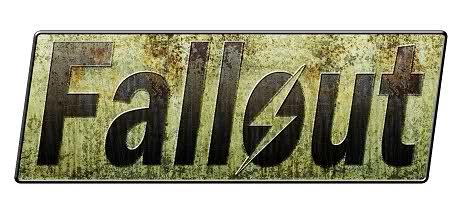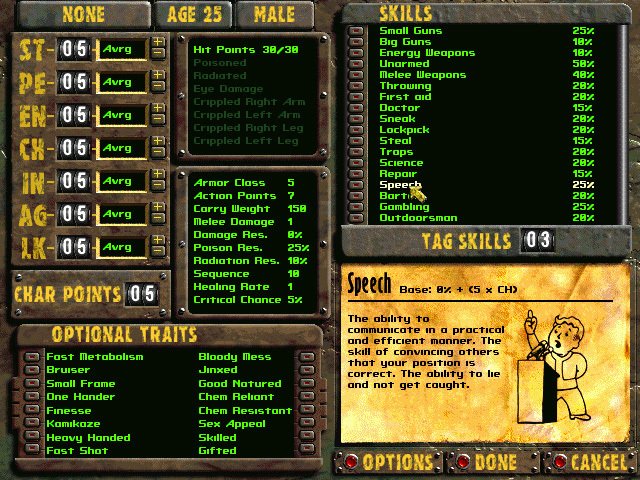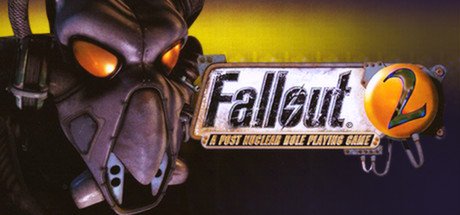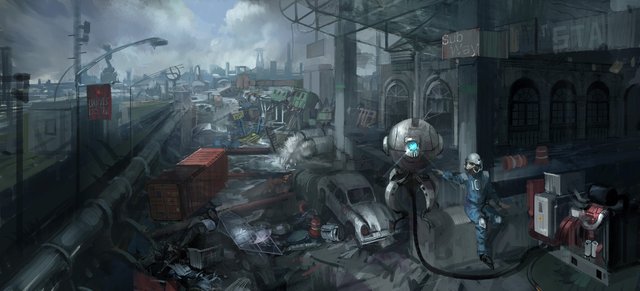The FALLOUT Series - The Forgotten 2D Era

Pretty much anyone that plays games to some degree, knows about Bethesda's Fallout 4, a game set in a post apocalyptic world in which you roam the remnants of a bombed out Boston and the surrounding areas beautifully rendered in 3D. You go from shack to shack, find reformed human and other creatures' settlements, taking quests, finding and crafting weapons and generally exploring and influencing the world. The newest iteration is an expansive game, but who remembers the origins of the franchise?
Initial development
In 1994 Interplay announced a future game using the GRUPS role-playing system, a licence recently acquired by the development studio. It was originally intended as a sequel to the critically acclaimed game, Wasteland, but because the intellectual property rights had not been sold to them, multiple titles were proposed, such as GURPS: Wasteland or Vault 13: A GURPS Post-Nuclear Adventure, finally settling on Fallout, a name chosen by the Interplay studio boss, Brian Fargo.
The same year, Tim Cain had begun work on the game engine all by his lonesome, working and setting up the core mechanics of the game in around six months, later on assembling a team of 30 people during the three years of development until launch. The violent nature of the game led to a dispute with Steve Jackson Games, thus prompting the abandonment of the GRUPS system, instead Interplay opting to create a new system that we all know today as the S.P.E.C.I.A.L. system.
S.P.E.C.I.A.L.
This stands for Strength, Perception, Endurance, Charisma, Intelligence, Agility and Luck, all basic attributes for a character that can be configured at the start of the game. They could take a value from 1 to 10, points deducted from a limited pool. The start value of these attributes award a proportional value of 0-50, for all the 18 skills the player's character can possess and develop over the course of the game, up to a value of 200. Once leveling up, skill points would be awarded, and every 4 levels(without any other modifications) a trait could be chosen. These traits would range from more strength and carrying capacity, to a higher chance of encounters ending in A Bloody Mess, and would usually buff some attributes and skills, while hindering others. Below you have a screenshot of the system and its features at the start of the game, when the player was prompted to set up the initial state of the character they would roleplay from there on.

Influences and Setting
The game is set in a future of an alternate timeline that deviated from ours sometime in the 1950s. In this universe, technology evolves without the advent of the transistor, thus vacuum tubes are used, and nuclear energy is dominant. This nuclear centric world is observable in the game's art, fictional magazines and ads. They are inspired by comics such as Atomic Age. This retro-future with a ridiculous but somewhat believable outcome that permeated the world before the apocalypse, and after in an attempt by emerging societies to rebuild, would become a staple of the Fallout series.
In this universe, in 2077, after vital resources around the world start to dwindle, the main superpowers struggle for control. These are the USA and China. In this fight for oil and uranium, China annexes Alaska in a swift battle at Anchorage, but later the US annexes Canada to fuel its war effort and economy. Amidst these growing tensions, someone unleashed nuclear hell, with both sides committed to mutually assured destruction. Although it is unknown who fired first, the nuclear devastation left in its wake is, with most of the world doomed to blasts and radiation with just pockets of humans surviving in underground vaults in closed and heavily regulated societies for about 100 years. It is here that the player starts the game when his/her vault, number 13, runs out of clean water as its purifier malfunctions.
The player is thus, sent out into the wasteland to find a replacement. There he/she would discover villages sprung up with limited scavenged technology. Different weird factions inhabit this new world upon the remnants of old California. Some venerate the atom bombs, some are just thugs, some just eek out a living on limited resources using mutated two-headed cows, now known as brahmin to conduct trade, while other obsessively hoard all technology they can get their hands on. But although society is not peaceful and technology is no longer widespread, powerful entities still have access to laser and plasma weaponry and other advanced equipment. This strange, but interesting world is inspired by other media such as the movie franchise, Mad Max, or Blade Runner and Doctor Who, even including random Tardis encounters and a dog as an optional party member, named Dogmeat.
Gameplay

The game revolves around the player exploring the wasteland, finding settlements and interacting with its inhabitants. Alot of these encounters feature fully voiced characters. They interact with players in several ways by giving context of their situation and presenting lore, bartering, and offering up quests that often present themselves as moral conundrums with no clear good outcome. Just as the world they are set in, there are no clear winners in these quests, each outcome benefiting some and hindering others.
These quests, in addition to having multiple outcomes, that can also be achieved in more than one way, regardless of the choice you make. They can often be completed either by employing diplomacy to persuade or intimidate people, they can also be completed via stealth and hacking your way through computers and other electronic equipment, or by sheer force. Combat, unlike the majority of the real time travel and interactions in the game is turn based and is very similar to one of the game's inspiration, XCOM. The player is able to target specific body parts of their enemies with different chances of hitting, these chances scaling with the size of the enemy/body part, the distance to the target and weapon used and the player's skill with the weapon type.
Proficiency in all these areas can be developed over time by earning experience by doing quests, achieving significant feats, such as picking locks or sneaking past certain enemies. Experience needed to advance in levels increases the higher the level is. Skill points can be spent on different weapon skill such as small arms, or energy weapons, or diplomacy, barter, hacking ability, or stealth. On top of this, one can read book scattered throughout the wasteland, or buy them from vendors, as well as paying masters of these crafts to teach the player in their area of expertise, as well as installing implants.
Reception and the follow-up
Fallout launched in 1997 to critical acclaim garnering a total score of 89/100 on Metacritic, earning it several Game of the Year awards by multiple publications, ending up on several Best Game lists and accruing a heavy fan following becoming an instant classic. This success prompted a swift release of sequel in 1998

It was again published by Interplay, but this time it was not developed by them, but by Black Isle Studios It improved on pretty much every aspect of the original, featuring a much larger world, and was set in 2241, 80 years after the events of the first game.
Expanding on the concepts
Following the return of the protagonist of the first game to the vault with the new water purifier, he/she was exiled by the vault's inhabitants as he/she had been tainted by the outside world and apparently, no longer suitable to vault life. "The One" had set up a small settlement caller Arroyo afterwards. A few generations later, this settlement, now resembling a medieval village what worshipped its founder, came under hard times and sets out the player to find an almost mythical device called the G.E.C.K.(Garden of Eden Creation Kit), but only after passing a gruelling ritual/test to assure they're fit for the task of confronting the wasteland ahead, thus becoming the new "Chosen One".
Upon leaving the village in the quest for the G.E.C.K., which was supposed to be in the original Vault 13, the players explore the world again and interacting with people. The world hasn't changed much, unless you count even more weird stuff going about, more slavery, and more exploitation. But this grim presentation fleshes out the world even more than before, giving it character, possibly making this iteration the best Fallout game of them all. In any case, upon finding the vault, the player discovers that there are no humans to be found, just intelligent deathclaws to defeat. So now the player returns to Arroyo to find it captured by remnants of the US government, known as the Enclave, that resides on an off-shore oil rig. It is there that the player discovers where a new enemy introduced in this game comes from. These green mutants were genetically engineered by the Enclave using humans, including those from Vault 13 who had been isolated for over 200 years, by exposing them to the Forced Evolutionary Virus(FEV) in an attempt to create a superior being. But the FEV did not have all the effects expected of it. While it gave humans super strength and immunity to radiation, their intellect diminished significantly, thus proving a resilient, but ultimately, not difficult enemy.
Gameplay is pretty much the same as before, but features a host of quality of life improvement, such as a better and clearer UI, new buttons that aided in inventory management and bartering. New enemies and factions had been added that expanded the world, this time exposing the player to a more quirky side of the lore, featuring fully fledged towns with districts and power struggles. The karma system, also present in the first game, was expanded to allow different interactions with these factions, facilitating all sorts of opinions they would have on the player. Also, personal actions taken during the game would affect this opinion, even when not interacting with the faction directly, such as aiding faction X, an enemy of faction Y would cause your reputation with faction Y to take a hit.
Spin off and going dark
Fallout 2 was also very appreciated for its world building and interaction, garnering it an aggregate score of 86/100 on Metacritic, even becoming a finalist for best RGP, but ultimately lost to Baldur's Gate. But for some reason did not sell quite as expected, possibly due to very strong competition at the time and the rushed release leading to a multitude of bugs.
The cannon franchise would go dark for the next 10 years, with several announcement during that time, teasing fans to a follow up that finally arrived when Bethesda launched Fallout 3, bringing the series to the 3D realm for the first time. I will not be covering this direction in this post, but probably will share my thoughts later on in a separate article, once I have fully played Fallout 4.

During that time, a notable spin-off game had been launched with the moniker Fallout Tactics: Brotherhood of Steel. Unlike the original games, this game centered on the technology hoarding faction of the Brotherhood of Steel and was less of a strategy and RPG game than its predecessors and focuse more on tactical squad based combat rather than exploration. The player still had to be human, but other allies and recruits could be several races and instead of being the single turn based system, it used three types of combat. A continuous one that would refresh actions according to the ability score of each squad member, individual turn based, similar to the originals and a variation of the latter called single turn based. Missions were given by a general of the BoS bunker, instead of focusing on towns and exploration, while interactions with NPCs were much more limited.
The simpler world and character development featured in this spin off made it be less appreciated by fans of the series, but still garnering a following due to the improved and more complex battle system that now had modifiers on the stance of the characters and height influencing shot chance. All this contributed to a very respectable score of 82/100 on Metacritic.
Conclusion

The Fallout series launched to critical acclaim and I for one am grateful for its existence. I loved the original two games as the world was ridiculous but nonetheless believable and worthy of exploration. The quirky characters peppered throughout its expanses were interesting and had individual wants and ambitions, making for very interesting interactions. The combat was not shabby either, though by today's standards, too deep in some areas, while simplistic in others. For some reason the spin off was not really to my liking, though I am a big fan of Jagged Alliance 2, a game with which it shares plenty of similarities. Unfortunately, the financial troubles of Interplay at the turn of the millenium led to the closure of the studio, making me wonder what might have come out if they had continued. Nonetheless, Bethesda's revival of the series was welcome, though for me, not nearly as engaging, except for Fallout: New Vegas, that isn't really Bethesda's merit. Here's hoping for a brighter future of the series!
What are your thoughts? Have you played the originals, or am I just old and in a minority regarding these games? Share your opinions and feedback below, it is greatly appreciated!
Thank you for reading, and keep on steemin'!
(clicking on any image will take you to its source)
Solid content. Fallout 2 is my favorite ISO RPG.
If you're wondering what would have happened if they continued look into Troika Games, and the game Arcanum.
Also, know that Tim Cain, Leonard Boyarsky, and Feargus Irquahart are currently all working together on an unannounced project. Just typing that hypes me up.
Thank you! Yeah, Fallout 2 was damn awesome :)
Thanks for the tip with Arcanum. From what I've seen, looks like it plays like Fallout, but it's not a continuation of it. What I meant with that line with my post is whether Fallout 3 would've been better than Bethesda's take, as I think that the games that they did were easily the worst in the series. They make good foundations for someone like Obsidian to come and make a proper Fallout game though :p
And if they're working on something, I need to know then. Getting hyped... any links to the project?
Wow, extensive coverage! I wrote one of these a few years back - will definitely read yours. Nice to see so much effort put into posts!
I've just gone live with one of the guys who contributed some of the writing on the original Fallout (and named Dogmeat!) so you can check it here:
https://steemit.com/gaming/@badastroza/interesting-people-17-scott-bennie-on-rpg-writing
Also, a while back I posted an interview with Josh Sawyer on the making of Fallout: New Vegas, which you can find here if you're interested!
https://steemit.com/gaming/@badastroza/interesting-people-7-josh-sawyer-on-fallout-new-vegas
Thank you! I try to cover as best I can. I'm no writer, but I try to understand the topic at hand.
I'll check those out, but I'm busy right now. They're bookmarked for later reading. :)
upvoted @jero1
upvoted
Thank you!
I'm planning on getting Fallout 1+2
ifwhen my play time becomes stable again... wish that happen soonWorth a play. Get the on GoG. They made them run on modern systems and have them on sale quite often.
Cheers for a well done article !
Thank you!
Best retro game ever !
Indeed! Which one did you like best?